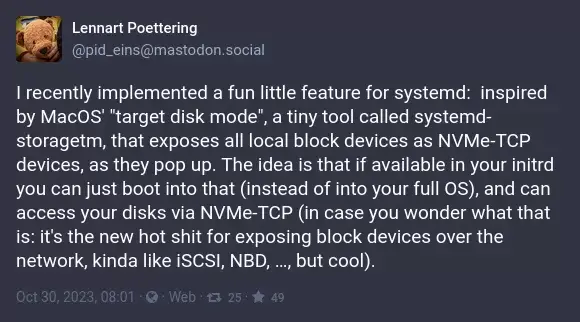this post was submitted on 31 Oct 2023
323 points (95.8% liked)
Linux
48141 readers
613 users here now
From Wikipedia, the free encyclopedia
Linux is a family of open source Unix-like operating systems based on the Linux kernel, an operating system kernel first released on September 17, 1991 by Linus Torvalds. Linux is typically packaged in a Linux distribution (or distro for short).
Distributions include the Linux kernel and supporting system software and libraries, many of which are provided by the GNU Project. Many Linux distributions use the word "Linux" in their name, but the Free Software Foundation uses the name GNU/Linux to emphasize the importance of GNU software, causing some controversy.
Rules
- Posts must be relevant to operating systems running the Linux kernel. GNU/Linux or otherwise.
- No misinformation
- No NSFW content
- No hate speech, bigotry, etc
Related Communities
Community icon by Alpár-Etele Méder, licensed under CC BY 3.0
founded 5 years ago
MODERATORS
you are viewing a single comment's thread
view the rest of the comments
view the rest of the comments

From what I see in the repo, this functionality is being built into systemd (in the same vein as something like systemd-resolved), and introduces a new target dedicated for the new feature.
Sure, you could probably rip it out and use it with your own init system, but that seems tedious to now scour the documentation to ensure your init system brings up the 'dependencies' launched at the preceeding systemd targets, so the NVMe TCP service can run.
Would be easier to just use another existing implementation IMO, most people running their own init systems probably want more than the bare minimum featureset offered by the services included in systemd's package